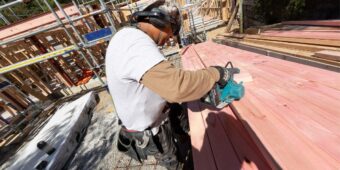Building Levy threshold reduced
29 Apr 2024, Industry News, News

The Government has announced changes to the Building Levy threshold that will reduce the amount it costs builders and homeowners to complete work
The Building Levy amount is paid to MBIE by a building owner or developer when they submit their building plans to a Building Consent Authority (BCA) for building consent for a building project. The BCA that processes the consent receives 3% of the total as an administration fee.
“It funds a range of functions and activities under the Building Act 2004, including information and guidance, compliance, enforcement, monitoring and reporting,” said Antonia Reid, MBIE Policy Director.
Currently, if the value of building work that a homeowner or builder is completing is more than $20,444 (including GST), they need to pay a Building Levy.
The Levy threshold hasn’t changed in 30 years and has not kept up with the increasing value of building works, which was one of several catalysts for the consultation on whether it should be raised.
Following a review of the consultation, which ran between April and May 2023, the amount is set to increase to $65,000 (including GST) from 1 July 2024.
“Any building project worth $20,444 including GST or more is subject to the Building Levy, which is paid at $1.75 per $1,000 of building work value,” said Building and Construction Minister Chris Penk.
“Cabinet has agreed that from 1 July this year, all projects under $65,000 including GST will be exempt from paying the Levy. This change […] will mean Kiwis making small improvements to their homes, such as bathroom or kitchen renovations, will save up to $113.”
Broad industry agreement
The consultation received 59 submissions from BCAs, industry bodies and various individuals. Of those, 68.5% of submitters agreed the threshold should be increased to $65,000, and most thought it would reduce the cost for smaller building and construction projects.
Within the consultation, BCAs were asked how increasing the threshold to $65,000 would impact their work. The majority said it would have little or no impact, while some noted there would be some transition costs and others thought there would be a reduction in revenue generated from the 3% administration fee linked to the Levy rate. However, as this is a minor source of income, BCAs thought an increase to the Levy would have a minimal impact.
Spend the surplus!
The increase to the Building Levy threshold is in response to its $71.6m account balance, which the Treasury and Office of the Auditor General say should trend to zero over time. One of the objectives of the Levy is to maintain the account balance at or near zero.
To help meet those objectives, the Levy is used to fund MBIE’s functions and activities related to the building sector, such as an increase in investment in building system services such as:
- Digital channels and engagement.
- Compliance pathways.
- Building for climate change.
MBIE says the increased investment in services would result in better:
- Quality and volume of the information, education, and guidance delivered.
- Compliance pathways in areas such as the Building Code, and Acceptable Solutions and Verification Methods.
- Regulation of the building industry around climate change.
The consultation document proposed a budget of up to $6.3m per annum for regulatory service improvements, which could be met from the account surplus. 84.6% of submitters said they agreed with those investments.
No increase to Levy rate
An increase to the Building Levy rate was also proposed during the consultation. The current Levy rate is $1.75 per $1,000 of building work. During the consultation process, less than 50% of respondents were in favour of a reduction in the rate. Therefore, it will remain at $1.75.
Photo credit: immo RENOVATION on Unsplash
Register to earn LBP Points Sign in



